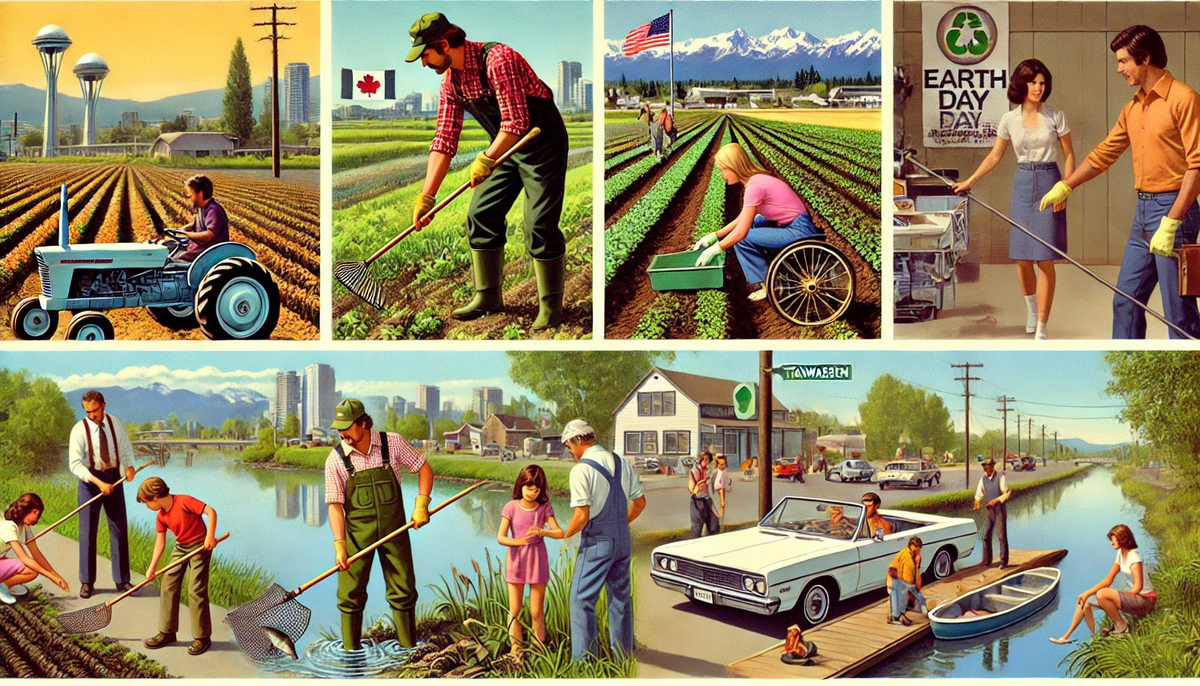
The 1970s marked a transformative period for Ladner, Tsawwassen, and the broader South Delta region. Amid growing global awareness of environmental issues, these communities embraced sustainable practices that reshaped their industries and strengthened their connection to the natural landscape. From fishing and agriculture to grassroots advocacy, South Delta emerged as a leader in environmental consciousness.
Fishing Industry: Navigating New Regulations
In response to declining fish populations, the federal government introduced stricter fishing regulations during the 1970s. These changes included seasonal restrictions, catch limits, and licensing requirements. For South Delta fishers, compliance meant rethinking traditional practices. Many invested in advanced equipment, such as refrigeration systems and more efficient nets, to preserve catches and reduce waste.
The challenges of adaptation also brought opportunities. Local fishers began collaborating on initiatives to protect the Fraser River’s ecosystem, recognizing the critical link between sustainable practices and the longevity of their livelihoods. Fisheries in Ladner and Tsawwassen became early adopters of eco-conscious methods, setting an example for sustainable industry across British Columbia.
Agriculture: Protecting Farmland and Resources
Agriculture, a cornerstone of Ladner and Tsawwassen’s economy, underwent significant changes during the 1970s. Farmers shifted toward crop rotation, soil conservation techniques, and efficient water management systems. This not only enhanced productivity but also reduced the environmental impact of farming.
The decade saw the rise of local advocacy groups focused on protecting farmland and wetlands from urban sprawl. Organizations like the Delta Farmland and Wildlife Trust were formed to preserve the region’s unique agricultural landscape, emphasizing the importance of balancing development with conservation. These efforts influenced land-use policies that prioritized sustainable growth and protected South Delta’s farming legacy.
Community Advocacy and Awareness
Grassroots movements played a pivotal role in fostering environmental awareness. Events like Earth Day celebrations and shoreline clean-up drives gained momentum, drawing attention to the importance of preserving South Delta’s natural beauty. These initiatives inspired residents to take action, strengthening community bonds and encouraging stewardship of the region’s ecosystems.
Local markets began promoting organic and eco-friendly products, foreshadowing the later success of South Delta’s farmers’ markets. This shift not only aligned with environmental values but also supported small-scale producers who prioritized sustainability.
Legacy of the 1970s
By the end of the decade, Ladner and Tsawwassen had established themselves as environmentally conscious communities committed to balancing economic growth with ecological preservation. The efforts of the 1970s laid the groundwork for the sustainable practices and community-driven initiatives that continue to define South Delta today.
WRN News - South Delta Edition
Robert Skinner - Publisher
Tags: #South Delta #Robert Skinner- Publisher #WRN News - South Delta Edition #Delta #Ladner B.C. #Tsawwassen #1970

